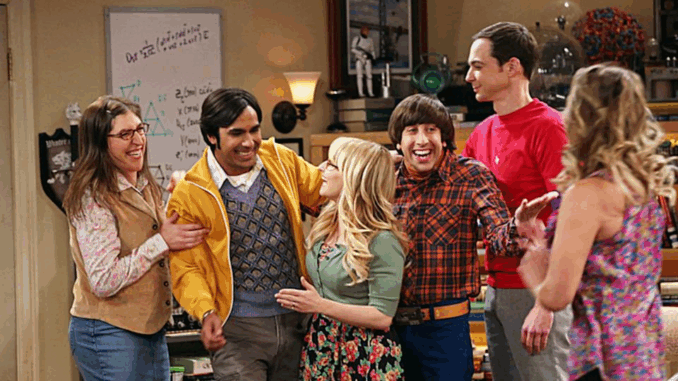
The Big Bang Theory’s Final Chapter: Unpacking the Behind-the-Scenes Drama of Its Ending
“Bazinga!” For twelve glorious seasons, “The Big Bang Theory” brought laughter, science, and the endearing quirks of its Pasadena gang into our living rooms. But even the most groundbreaking theories eventually reach their conclusion. Now, the cast and crew have begun to open up about the behind-the-scenes drama that led to the bittersweet decision of bringing this beloved sitcom to an end. Prepare for some surprising revelations and a deeper look into the complex dynamics that shaped the show’s final curtain call.
The Unforeseen Equation: Jim Parsons’ Decision to Leave
At the heart of the drama surrounding “The Big Bang Theory”‘s ending lies the pivotal decision of its lead star, Jim Parsons, who so brilliantly portrayed the eccentric genius Sheldon Cooper. Parsons’ desire to step away from the show after twelve seasons sent shockwaves through the cast, crew, and the massive global fanbase. It wasn’t a clash of egos or a dramatic falling out, but rather a personal realization that it was time for him to explore new creative avenues. It’s like the main gear in a complex machine deciding it’s time to power down, inevitably affecting the entire system.
A Personal Crossroads: Parsons’ Desire for New Challenges
After portraying the iconic Sheldon Cooper for over a decade, Parsons reached a point where he felt ready to embrace new challenges and explore different roles. The demanding schedule of a long-running sitcom can be all-consuming, and Parsons felt a pull towards other projects and personal pursuits. It wasn’t a dissatisfaction with “The Big Bang Theory,” but rather a natural desire for artistic growth and a change of pace. It’s like a star athlete knowing when it’s time to retire at the peak of their game to pursue other passions.
The Domino Effect: Parsons’ Departure and the Show’s Fate
The news of Parsons’ decision to leave created a ripple effect that ultimately led to the show’s conclusion. “The Big Bang Theory” was so deeply intertwined with the character of Sheldon Cooper that the idea of continuing without him felt unimaginable to the creators and the network. It was clear that trying to replicate the show’s magic without its central figure would be a daunting, if not impossible, task. It’s like trying to bake a cake without the key ingredient – it simply wouldn’t be the same.
A Family’s End: The Emotional Toll on the Cast and Crew
The decision to end “The Big Bang Theory” was undoubtedly an emotional one for the cast and crew who had become a close-knit family over twelve years. The show wasn’t just a job; it was a significant part of their lives, a place where they had grown both personally and professionally. Saying goodbye to that chapter was filled with both sadness and a sense of gratitude for the incredible journey they had shared. It’s like the bittersweet farewell at the end of a long and cherished summer camp.
Tears and Reflection: The Final Table Read
The final table read for the series finale was reportedly a highly emotional affair, filled with tears, laughter, and heartfelt reflections on the incredible run they had experienced together. It was a moment for the cast to truly grasp that their time together on “The Big Bang Theory” was coming to an end, marking the close of a significant chapter in their lives. It’s like the final gathering of a beloved team after winning the championship – a mix of joy and the poignant realization that it’s over.
A Decade of Laughter and Camaraderie: The Bonds Forged On Set
Over twelve seasons, the cast and crew of “The Big Bang Theory” forged deep and lasting bonds. They shared countless hours of laughter, supported each other through personal and professional milestones, and became a true on-screen and off-screen family. The end of the show meant saying goodbye to this daily camaraderie that had become an integral part of their lives. It’s like a tight-knit group of friends facing the prospect of going their separate ways after years of shared experiences.
The Weight of Legacy: Saying Goodbye to Iconic Characters
For the actors, saying goodbye to the iconic characters they had embodied for so long was a particularly poignant experience. These characters had become a part of their identities, and letting go of them was a significant emotional undertaking. It was like saying farewell to a cherished alter ego that had brought them immense joy and recognition.
Creative Considerations: Ending on a High Note
Beyond Parsons’ personal decision, there was also a strong desire among the cast and crew to end “The Big Bang Theory” on a high note, rather than allowing it to potentially decline in quality over time. They wanted to give the characters and the fans a satisfying and meaningful conclusion that honored the show’s legacy. It’s like a band deciding to end their tour with an unforgettable encore while they’re still at the top of their game.

Storytelling Integrity: Giving the Characters a Proper Farewell
The writers and producers were committed to crafting a series finale that felt true to the characters and their journeys. They wanted to provide closure for long-standing storylines and give each character a sense of resolution, ensuring that the ending felt earned and satisfying for the loyal viewers who had invested so much time in the show. It’s like a skilled storyteller carefully weaving together all the loose threads to create a cohesive and fulfilling ending.
Avoiding “Jumping the Shark”: Preserving the Show’s Quality
The fear of a beloved show overstaying its welcome and declining in quality is a common concern in television. The cast and crew of “The Big Bang Theory” were acutely aware of this and felt that ending the show after twelve successful seasons would be the best way to preserve its legacy and avoid the risk of “jumping the shark.” It’s like knowing when to leave the party while it’s still fun, rather than sticking around until the energy fades.
The Perfect Ending? Crafting a Satisfying Conclusion for the Fans
Crafting a series finale that satisfies millions of passionate fans is a monumental task. The writers and producers poured their hearts into creating an ending that felt both conclusive and heartwarming, honoring the relationships and the humor that had made the show so beloved. It was a delicate balancing act, trying to give each character a fitting send-off while still delivering the laughs that the audience had come to expect. It’s like trying to write the perfect final note to a beloved symphony.
The Financial Implications: A Lucrative Run Coming to an End
While creative and personal reasons were paramount in the decision to end “The Big Bang Theory,” the financial implications of losing its lead star were also undoubtedly a factor. Jim Parsons’ departure would have necessitated significant renegotiations and potentially altered the show’s financial structure. Ending the show allowed all involved to conclude this incredibly lucrative chapter on their own terms. It’s like a successful business knowing when it’s the right time to close a highly profitable venture gracefully.
A Top-Rated Comedy: The End of an Era for CBS
“The Big Bang Theory” was a ratings juggernaut for CBS, consistently ranking as one of the most-watched comedies on television for over a decade. Its absence left a significant void in the network’s lineup, highlighting the show’s immense popularity and its importance to CBS’s success. It’s like a flagship product being discontinued, leaving a noticeable gap in the company’s offerings.
The Cast’s Salaries: Significant Financial Considerations
As the show progressed, the salaries of the main cast members had grown to be substantial. Continuing the show without Parsons would have likely involved complex salary negotiations and potentially altered the pay structure for the remaining actors. Ending the show provided a clean break from these significant financial obligations. It’s like a company streamlining its budget by concluding a major expense.
Spin-Off Success: “Young Sheldon” Continues the Legacy
While “The Big Bang Theory” has concluded, its legacy lives on through the successful spin-off series “Young Sheldon,” which explores the childhood of Jim Parsons’ iconic character. This spin-off has allowed the universe of “The Big Bang Theory” to continue in a new and engaging way, providing fans with more stories and insights into the origins of their favorite socially awkward genius. It’s like a beloved franchise expanding with a successful prequel.
Conclusion:
The ending of “The Big Bang Theory,” while bittersweet for fans, was a culmination of various factors, most notably Jim Parsons’ personal decision to move on to new creative endeavors. This pivotal choice had a domino effect, leading the cast and crew to the emotional realization that their time together on the show was drawing to a close. Coupled with a desire to honor the show’s legacy by ending on a high note and the inevitable financial considerations, the decision to conclude after twelve successful seasons ultimately felt like the right one. While we may miss the weekly doses of laughter and scientific shenanigans, the behind-the-scenes drama underscores the complex human element involved in bringing such a beloved show to its conclusion, ensuring that “The Big Bang Theory” will forever hold a special place in television history.
FAQs:
- What was the primary reason for “The Big Bang Theory” coming to an end? Jim Parsons’ decision to leave the show after twelve seasons was the main catalyst for its conclusion.
- How did the cast and crew react to the show ending? The decision was reportedly emotional for the cast and crew, who had become a close-knit family over the show’s long run.
- Why did Jim Parsons decide to leave “The Big Bang Theory”? Parsons felt it was the right time for him to explore new creative challenges and personal pursuits after playing Sheldon Cooper for over a decade.
- Did the creators consider continuing “The Big Bang Theory” without Sheldon? The character of Sheldon was so integral to the show that continuing without Jim Parsons in the role was deemed unlikely to capture the same magic.
- How did the cast and crew want the show to end? There was a strong desire to give the characters a satisfying and meaningful conclusion that honored the show’s legacy and pleased the loyal fanbase.
